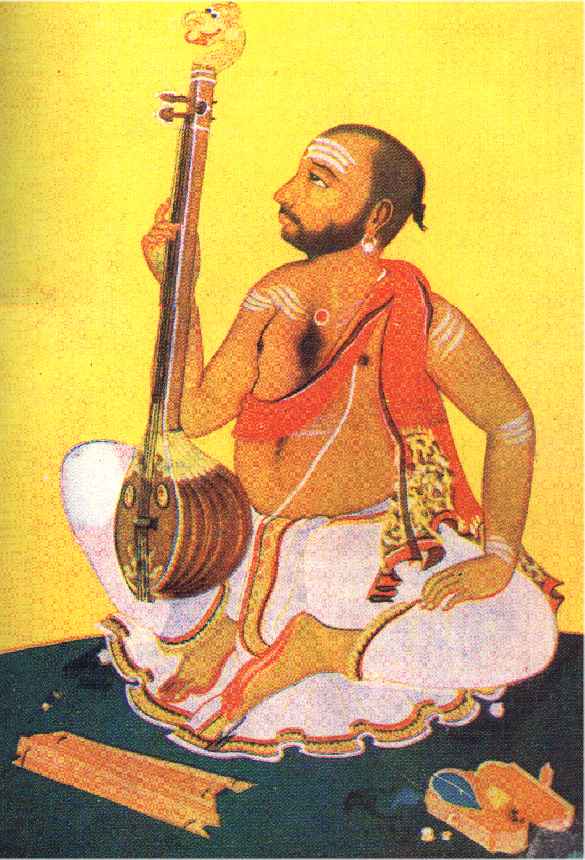
Contributed by The Hindu

![]()
SYAMA SASTRI was born to Visvanatha Iyer and Vengalakshmi on April 2, 1762. He was a Tamil - speaking brahmin known as auttara vadama. Visvanatha Iyer and his forefathers were archakas in the temple of Goddess Bangaru Kamakshi.
Syama Sastri's actual name was Venkata Subrahmanya. But he was affectionately called Syama Sastri. At the age of seven, his Upanayanam was performed. He was taught devotional songs, given sound education in Sanskrit and Telugu. He used to accompany his father to the temple. Gradually his faith in the Goddess grew. Finding his aptitude for music, his mother requested her cousins to teach him the fundamentals of music. Within a short period, the boy became proficient in it.
When Syama Sastri was 18, his father settled down at Thanjavur. A sanyasi, Sangita Svami, an Andhra brahmin, came to their house from Banares. He was pleased with the talents of Syama Sastri and offered to be his guru. After teaching him the mysteries underlying the raga and tala prastaras, he directed Syama Sastri to go to Paccimiriyam Adiyappayya. As per Swamiji's advice, Syama Sastri approached Adiyappayya and the influence of Adiyappayya is reflected in his svarajati -kamakshi' in Bhairavi raga.
Once, Kesavayya, a great musician from Bobbili, came to Thanjavur and challenged the court musicians in handling intricate talas. Syama Sastri had to face him. He entered the temple and stood in deep meditation. He sang "Devi brova samayamide' meaning "Devi! now it is the time for you to protect me". Later he gained confidence and went to the court to face the contest and defeated the challenger.
Muthuuswami Dikshitar and Syama Sastri were good friends. They often met and spent hours together singing. Syama Sastri had deep regard for Tyagaraja.
Once Syama Sastri was singing Brhadamba in Pudukottai, an elderly saint was pleased and directed him to go to Madurai and sing in praise of Meenaksi Amman and receive her blessings. Syama Sastri decided to do so and composed "navaratnamalika' (nine kritis)
Once at Nagapattinam, Syama Sastri defeated in a contest Appukutti Nattuvanar who was proficient in music. Consequently Appukutti forfeited his tambura and tala for ever.
Most of Syama Sastri's compositions are in praise of Devi. He composed about 300 songs. Though he was a Tamil he had chosen Telugu as the medium of expression for his songs because of the inherent beauty of that language. There are a few Sanskrit and Tamil songs also.
His style is neither simple as that of Tyagaraja nor difficult as that of Muthuswami Dikshitar. He signed his songs as Syama Krsna. He died on February 6, 1827, at the age of 65.
![]()
Contributed by The Hindu
Back to the Trinity Homepage
Back to the Main Page